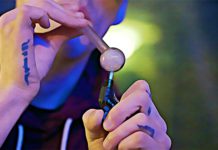byproduct of stigma, which does affect patients in several different levels.
“There’s stigma within the field of health care providers and there’s also stigma from patients’ families,” he said. “There’s political and cultural stigma. Then there’s this sense of internalized stigma, where patients with addiction and substance use disorders in general end up believing in the negative cultural perceptions, which can prevent them from engaging in treatment or believing that recovery is something that is achievable.”
According to Aoun, negative perceptions and attitudes derived from stigma are also noticed among patients who suffer from mental illness and who should be able to receive needed medical support and compassion. Healthcare professionals should be trained to have the ability to look at impalpable conditions as depression or addiction as the clinical disorders they are, but too often that’s not the case.
“While stigma is still an issue for non-addiction related psychiatric disorders, it is even more of a problem in addiction,” he said. “To be honest, that’s one of the biggest problems we face at this point. A lot of healthcare providers, in general, perceive addiction as a moral failure, even though these are people who have achieved high levels of education and we have plenty of research and evidence that addiction is a disease.”
Diabetes or hypertension can be developed because of unhealthy habits, but people may have a natural predisposition to develop those conditions as well. Addiction should be looked at the same way by psychiatrists, Aoun said.
“A lot of people and health care providers struggle with the initial development of addiction,” he said. “Some people say, ‘they started using heroin, they shouldn’t have done that.’ Well acting like that toward people who have a disorder because of a decision they made is not healthy or ethical.”
Studies that explored the way addiction is perceived by people around the world and by doctors emphasize that further interpersonal education might be the only way to improve attitudes toward illicit drug users.
“The more people are educated around addiction, the more likely they are to understand that having an addiction is just like having diabetes and that treatment is just as effective as long as the person is engaged,” Aoun concluded.
















